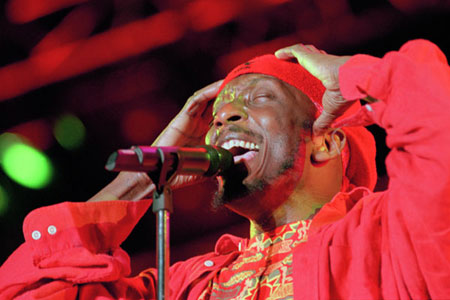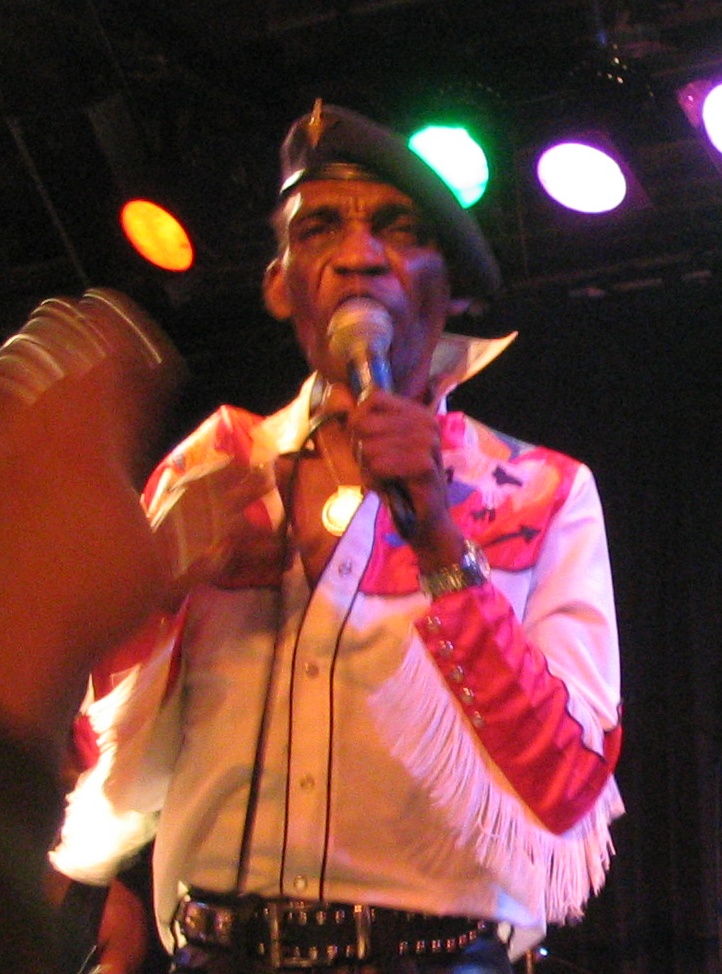sexta-feira, abril 01, 2022
Jimmy Cliff nasceu há 74 anos
Postado por
Fernando Martins
às
07:40
0
bocas
![]()
Marcadores: I Can See Clearly Now, Jamaica, Jimmy Cliff, música, reggae
terça-feira, março 01, 2022
Música adequada à data...!
Postado por
Pedro Luna
às
00:10
0
bocas
![]()
Marcadores: actor, calipso, cinema, Harry Belafonte, Jamaica, Jamaica Farewell, música, USA
domingo, fevereiro 06, 2022
Three Little Birds...
Postado por
Pedro Luna
às
07:07
0
bocas
![]()
Marcadores: Bob Marley, guitarra, Jamaica, música, rastafari, reggae, rocksteady, ska, Three little birds
Bob Marley nasceu há 77 anos...
Robert Nesta Marley, mais conhecido como Bob Marley (Nine Mile, 6 de fevereiro de 1945 - Miami, 11 de maio de 1981), foi um cantor, guitarrista e compositor jamaicano, o mais conhecido músico de reggae de todos os tempos, famoso por popularizar o género. Marley já vendeu mais de 75 milhões de discos. A maior parte do seu trabalho lidava com os problemas dos pobres e oprimidos. Levou, através de sua música, o movimento rastafari e suas ideias de paz, irmandade, igualdade social, preservação ambiental, libertação, resistência, liberdade e amor universal ao mundo. A música de Marley foi fortemente influenciada pelas questões sociais e políticas de sua terra natal, fazendo com que considerassem-no a voz do povo negro, pobre e oprimido da Jamaica. A África e seus problemas como a miséria, guerras e domínio europeu também foram centro de assunto das suas músicas, por se tratar da terra sagrada do movimento rastafari.
Postado por
Fernando Martins
às
00:07
0
bocas
![]()
Marcadores: Bob Marley, Could You Be Loved, guitarra, Jamaica, música, rastafari, reggae, rocksteady, ska
segunda-feira, janeiro 24, 2022
Busy Signal faz hoje quarenta anos...!
Busy Signal, nome artístico de Glendale Goshia Gordon (Saint Ann Parish, Jamaica, 24 de janeiro de 1982), também conhecido por seu outro nome artístico, Reanno Devon Gordon) é um artista de dancehall reggae da Jamaica. Foi colocado pelo Reggae Music Again da BBC Music no 7º na lista de 25 melhores álbuns de 2012.
Busy Signal participou no álbum dos No Doubt Push and Shove, colaborando com a banda e a equipa de produção de Major Lazer na faixa título. Ele também aparece no segundo álbum de Major Lazer, Free the Universe, na faixa "Watch Out For This (Bumaye)", um sucesso na Europa.
Postado por
Fernando Martins
às
00:40
0
bocas
![]()
Marcadores: Busy Signal, Come Over (Missing You), dancehall reggae, Jamaica, música, Reanno Devon Gordon
domingo, janeiro 09, 2022
Sean Paul - 49 anos
Postado por
Fernando Martins
às
00:49
0
bocas
![]()
Marcadores: hip-hop, Jamaica, música, Other Side of Love, reggae, Rhythm and Blues, Sean Paul, Temperature
domingo, dezembro 05, 2021
Wayne Smith nasceu há 56 anos
Postado por
Fernando Martins
às
00:56
0
bocas
![]()
Marcadores: Dancehall, Jamaica, música, reggae, Under Me Sleng Teng, Wayne Smith
segunda-feira, outubro 25, 2021
Gregory Isaacs morreu há onze anos
Postado por
Fernando Martins
às
11:00
0
bocas
![]()
Marcadores: Gregory Isaacs, Jamaica, música, Night Nurse, reggae
terça-feira, outubro 19, 2021
Música adequada à data...
Postado por
Pedro Luna
às
07:00
0
bocas
![]()
Marcadores: Jamaica, John Holt, Man Next Door, música, reggae, The Paragons
John Holt morreu há sete anos...
Postado por
Fernando Martins
às
00:07
0
bocas
![]()
Marcadores: Jamaica, John Holt, música, Police In Helicopter, reggae, The Paragons
sexta-feira, julho 16, 2021
Desmond Dekker não foi esquecido por grandes músicos...
Ob-La-Di, Ob-La-Da - The Beatles
Desmond has a barrow in the marketplace
Molly is the singer in a band
Desmond say to Molly, girl I like your face
And Molly says this as she takes him by the hand
Obladi, oblada
Life goes on, brah
La la how their life goes on
Obladi, oblada
Life goes on, brah
La la how their life goes on
Desmond takes a trolley to the jewelers store
Buys a twenty carat golden ring, (rin-ring)
Takes it back to Molly waiting at the door
And as he gives it to her she begins to sing (sin-sing)
Obladi, oblada
Life goes on, brah
La la how their life goes on
Obladi, oblada
Life goes on, brah
La la how their life goes on
Yeah, in a couple of years they
Have built a home sweet home
With a couple of kids running in the yard
Of Desmond and Molly Jones
Happy ever after in the market place
Desmond lets the children lend a hand
Molly stays at home and does her pretty face
And in the evening she's a singer with the band
Obladi, oblada
Life goes on, brah
La la how their life goes on
Obladi, oblada
Life goes on, brah
La la how their life goes on
In a couple of years they
Have built a home sweet home
With a couple of kids running in the yard
Of Desmond and Molly Jones
Happy ever after in the market place
Molly lets the children lend a hand
Desmond stays at home and does his pretty face
And in the evening she's a singer with the band
Obladi, oblada
Life goes on, brah
La la how their life goes on
Obladi, oblada
Life goes on, brah
La la how their life goes on
And if you want some fun
Take ob-la-di, bla-da
Roots Radicals - Rancid
He was on there he was waitin' for me
All the punk rockers and the moon stompers
Are out on the corners where
They sparing for change
I don't remember too much of that day
Something struck me funny when we ran out of money
Where do you go now when you're only fifteen?
It bleeds in me
And it goes
Give 'em the boot, you know I'm a radical
Give 'em the boot, the roots, the reggae on my stereo
On the 43 bus as we climbed up the hill
Nothing incoming but the reggae drumming
And we all come from unloving homes, I said
Mr. Bus Driver please let these people on
Rude girl Carol was a mini-skirt girl
My blurry vision saw nothin' wrong
It bleeds in me
And it goes
Give 'em the boot, you know I'm a radical
Give 'em the boot, the roots, the reggae on my stereo
On my stereo
Yeah yeah, yeah yeah yeah yeah yeah
Yeah yeah, yeah yeah yeah yeah yeah
Yeah yeah, yeah yeah yeah yeah yeah
He was on there, he was waiting for me
All the punk rockers and the moon stompers
Are out on the corners where they're sparing for change
On the 43 bus as we climbed up the hill
Rude girl Carol was a mini-skirt girl
My blurry vision saw nothing wrong
It bleeds in me
And it goes
Give 'em the boot, you know I'm a radical
Give 'em the boot, the roots, the reggae on my stereo
Give 'em the boot, you know I'm a radical
Give 'em the boot, the roots, the reggae on my stereo
Parry the Wind High Low - Frank Black
You know you can't go real far
Well, they could treat you real nice
Or put a tracking device
Way down inside
At the UFO convention tonight
Planes above the Hilton make it sunny
Brought my money tonight
Strumming guitars of instruction tonight
A lot of wannabe truckers making eyes
With starfuckers tonight
Electric glasses with lights
They got me feeling deluxe
For just a couple of bucks
Way down inside
And it sounds like soul records to me
They're waving hi from some gazebo
Waving on to Arecibo to me
Sounds like soul records to me
I'm getting patterns from a trekker
Sounds like Desmond Dekker to me
In your silo
Transmarine
Things you've never seen
Postado por
Pedro Luna
às
11:11
0
bocas
![]()
Marcadores: Desmond Dekker, Frank Black, Israelites, Jamaica, música, Ob-La-Da, Ob-La-Di, Parry the Wind High Low, Rancid, reggae, Roots Radicals, ska, The Beatles
Música adequada à data...
Postado por
Pedro Luna
às
08:00
0
bocas
![]()
Marcadores: 007 (Shanty Town), Desmond Dekker, Jamaica, música, reggae, ska
Desmond Dekker nasceu há oitenta anos!
Foi o primeiro artista jamaicano a ser considerado uma lenda do reggae. O seus maiores sucessos foram "Israelites" e "007 (Shanty Town)".
Desmond foi um dos pais e pioneiros do skinhead reggae. Foi mencionado em canções de diversos músicos ao longo dos anos, como The Beatles na música "Ob-La-Di, Ob-La-Da", Rancid na música "Roots Radicals", Frank Black na música "Parry the Wind High Low" , entre outros.
Vida
Desmond Dekker perdeu os pais durante a adolescência e foi nessa época que começou a trabalhar como soldador. No trabalho era encorajado pelos colegas a cantar, e por esse motivo, no ano de 1961, resolveu participar de uma audição para o selo Studio One, de "Coxsone" Dodd e para o selo Treasure Isle, de Duke Reid.
Nenhum dos dois ficou impressionado com Desmond, que resolveu tentar a sorte no selo de Leslie Kong, junto com Derick Morgan. Com o apoio de Morgan, conseguiu ser contratado, mas não pode gravar até 1963, pois Leslie Kong estava esperando Desmond achar a música perfeita. E foi com a música "Honour Your Father and Mother" que isso aconteceu. A música se tornou sucesso e em seguida vieram "Sinners Come Home" e "Labour for Learning". Foi nessa época que Desmond trocou seu sobrenome de Dacres para Dekker. O hit que veio em seguida foi "King of Ska", que contou com os The Maytals nos backing vocais.
Com a música "007 (Shanty Town)", tornou-se um ícone para os rude boys e uma das figuras mais importantes da cena mod britânica.
No final dos anos 70, assinou com o Stiff Records, um selo punk ligado ao movimento two tone e lá permaneceu de 1980 a 1983. Ainda nos anos 80, assinou um contrato com a Trojan Records, onde teve muitos de seus álbuns relançados.
Ao longo dos anos, continuava fazendo inúmeros shows pelo mundo, principalmente pela Europa. Morreu em 25 de maio de 2006, de ataque cardíaco, na sua residência em Surrey, na Inglaterra. Foi sepultado no Streatham Vale Cemetery, em Londres.
in Wikipédia
Postado por
Fernando Martins
às
00:08
0
bocas
![]()
Marcadores: Desmond Dekker, Israelites, Jamaica, música, reggae, ska
quinta-feira, julho 15, 2021
Gregory Isaacs nasceu há setenta anos
Postado por
Fernando Martins
às
00:07
0
bocas
![]()
Marcadores: Babylon Too Rough, Gregory Isaacs, Jamaica, música, reggae
segunda-feira, junho 07, 2021
Um sismo arrasou e fez desaparecer a antiga capital da Jamaica há 329 anos
in Wikipédia
Postado por
Fernando Martins
às
03:29
0
bocas
![]()
Marcadores: Caraíbas, Jamaica, Port Royal, sismo da Jamaica de 1692
terça-feira, maio 25, 2021
Saudades de Desmond Dekker...
Postado por
Geopedrados
às
22:22
0
bocas
![]()
Marcadores: Desmond Dekker, Honour Your Father And Mother, Jamaica, música, reggae, ska
Música adequada à data - porque um cantor nunca morre enquanto for lembrado...
Postado por
Pedro Luna
às
15:00
0
bocas
![]()
Marcadores: 007 Shanty Town, Desmond Dekker, Jamaica, música, reggae, ska
Desmond Dekker morreu há quinze anos
Foi o primeiro artista jamaicano a ser considerado uma lenda do reggae. O seus maiores sucessos foram "Israelites" e "007 (Shanty Town)".
Desmond foi um dos pais e pioneiros do skinhead reggae. Foi mencionado em canções de diversos músicos ao longo dos anos, como The Beatles na música "Ob-La-Di, Ob-La-Da", Rancid na música "Roots Radicals", Frank Black na música "Parry the Wind High Low" , entre outros.
Vida
Desmond Dekker perdeu os pais durante a adolescência e foi nessa época que começou a trabalhar como soldador. No trabalho era encorajado pelos colegas a cantar, e por esse motivo, no ano de 1961, resolveu participar de uma audição para o selo Studio One, de "Coxsone" Dodd e para o selo Treasure Isle, de Duke Reid.
Nenhum dos dois ficou impressionado com Desmond, que resolveu tentar a sorte no selo de Leslie Kong, junto com Derick Morgan. Com o apoio de Morgan, conseguiu ser contratado, mas não pode gravar até 1963, pois Leslie Kong estava esperando Desmond achar a música perfeita. E foi com a música "Honour Your Father and Mother" que isso aconteceu. A música se tornou sucesso e em seguida vieram "Sinners Come Home" e "Labour for Learning". Foi nessa época que Desmond trocou seu sobrenome de Dacres para Dekker. O hit que veio em seguida foi "King of Ska", que contou com os The Maytals nos backing vocais.
Com a música "007 (Shanty Town)", tornou-se um ícone para os rude boys e uma das figuras mais importantes da cena mod britânica.
No final dos anos 70, assinou com o Stiff Records, um selo punk ligado ao movimento two tone e lá permaneceu de 1980 a 1983. Ainda nos anos 80, assinou um contrato com a Trojan Records, onde teve muitos de seus álbuns relançados.
Ao longo dos anos, continuava fazendo inúmeros shows pelo mundo, principalmente pela Europa. Morreu em 25 de maio de 2006, de ataque cardíaco, na sua residência em Surrey, na Inglaterra. Foi enterrado no Streatham Vale Cemetery em Londres.
in Wikipédia
Postado por
Fernando Martins
às
00:15
0
bocas
![]()
Marcadores: Desmond Dekker, Israelites, Jamaica, música, reggae, ska
terça-feira, maio 11, 2021
Música para alegrar um dia triste...
Postado por
Geopedrados
às
04:00
0
bocas
![]()
Marcadores: Bob Marley, Buffalo Soldier, Jamaica, rastafari, reggae, rocksteady, ska
Saudades de Bob Marley...
Postado por
Pedro Luna
às
00:40
0
bocas
![]()
Marcadores: Bob Marley, Jamaica, rastafari, reggae, rocksteady, ska, Three little birds




.jpg)







